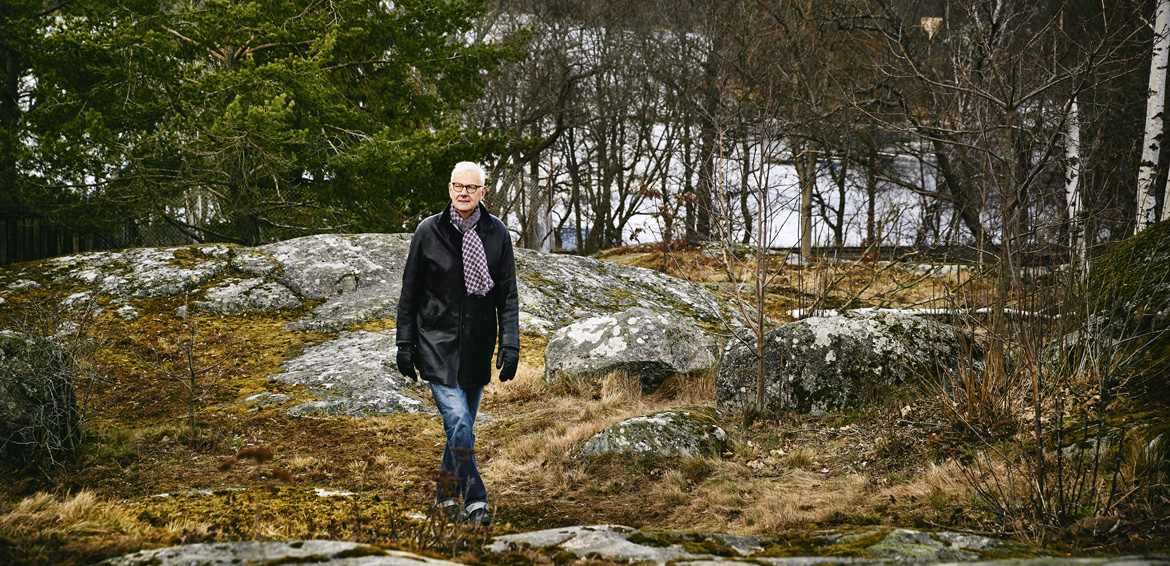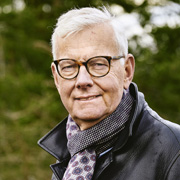Forest ownership in the Baltic states: “Tremendous potential for growth"

Photo: Christian Gustavsson
Urban Karlström was looking for a long-term investment that could be combined with his interest in nature, and started to cast his eyes eastwards towards the Baltic states. Together with his family, he invested in forest property in Latvia, with the guidance of Skogssällskapet. A collaboration partner that helped him check out the terrain – both literally and culturally.

Photo: Christian Gustavsson
Unlike many other Swedish forest owners in the Baltic states, Urban Karlström has never owned forest in Sweden, and his investment in Latvia is his first contact with the forest from a business perspective. It was about seven years ago when Latvia appeared on his horizon.
“We were interested in making a long-term investment in forest, in a market with good growth forecasts. After a lot of research, Latvia came up as a candidate with great potential for long-term return. At the same time, investing in what was, for us, totally alien market in another country would have been a major risk – and it was here that Skogssällskapet came into the picture.”
Help with investment and management
Uncertainty regarding a completely new regulatory framework, no knowledge of the language, nor about the long-term prospects for the Baltic countries, prompted Urban to contact Skogssällskapet, which has been operating in Latvia since the start of the 2000s.
He discussed his ambitions with Skogssällskapet, which produced a package of investments in forest areas. As the collaboration grew, Skogssällskapet increasingly took over the forest management.
“Skogssällskapet was the reason why we could invest in Latvia – without them it would never have happened. They have good local awareness and they have contact with people there who know the forest, the country, and the system. Very quickly, we felt we could trust Skogssällskapet. We had the same view on a long-term and responsible approach to forest development and management – quite simply, we totally bought into Skogssällskapet’s philosophy.”
Urban runs the company together with his wife and their two sons, an arrangement that he feels works well and helps to hold the family together.
“Running such a project together with my family is an added value in itself. It’s something we can all gather around, and it gives us the opportunity to work together towards a common goal. We all have an interest in this type of enterprise, but everyone has a different role and can engage to the extent time and capability allow. As a family we can commit over the long term; everyone agrees this is an investment for the future.”
A close eye on the business
Urban and his family knew right from the start that they wanted to own the forest themselves, unlike people who invest in a fund that, in turn, buys forest. This was because they wanted to be closely involved in the business.
“We chose to directly own the forest, to ensure we had greater insight and control and greater understanding of what we had invested in. Together with Skogssällskapet, we drew up a multi-year plan for our assets that we continually monitor and follow up. We have close dialogue on what measures are to be taken, and travel regularly to Latvia to keep a check on our forest stands. Even if we commission Skogssällskapet to manage the forest, we are active and physically present quite often. This feels both important and enjoyable.”
Urban explains that, for a Swede, with no previous experience of forest investments, Latvia and its forest management may seem quite alien and impenetrable.
“The big challenge has been to learn and really understand how forest management works in Latvia. You’re faced with a different language, different regulations, different traditions, different social codes. Going there as a visitor and trying to find your way about and understanding everything is difficult and takes time. It would have been virtually impossible in principle without the help of the Skogssällskapet team in Latvia. They help us to bridge both cultural and administrative differences, and we have a lot of confidence in them.”
Long-term sustainable investment
Buying forest land in Latvia can be both profitable and sustainable if the buyer has a long-term perspective. Urban has reviewed and evaluated the investments he has made since 2012, and can see that they have brought a good return. He is now well on the way to taking the next step.
“We’ve decided to increase our holding, because we’ve seen with our own eyes how much professional forest management can do for the forest. There is tremendous potential for growth. I’m also positive about how the country is developing, with a growing economy that favours future investments.”
But for Urban and his family, the forest is more than just a financial investment – there are other values beyond the purely financial that lay behind their decision to make the forest their arena.
“We’re very interested in nature and the outdoor life generally, and it feels great that we can combine this with long-term sustainable investments. This is a concrete form of ownership that means we can go for walks in our own forest and experience nature with everything it offers. We can enjoy the animal life, different habitats, and become part of something bigger. We can also make a long-term contribution to developing forestry in line with an ecological and sustainable society – an important goal that Skogssällskapet helps us attain.”
Text: Therese Johansson
